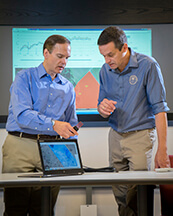January 11, 2016
Purdue-based agriculture software startup receives $225,000 grant from NSF
WEST LAFAYETTE, Ind. - A startup that licenses Purdue University-developed software that could help grape growers and winemakers optimize quality and yields in their vineyards has received a federal grant.
VinSense LLC has received a one-year, highly competitive STTR Phase I grant worth $224,949 from the National Science Foundation. CEO Larry Ebert said the grant will fund expansion of the company's technology and commercialization efforts.
"The VinSense system comprises two complementary software components. The first set provides information about available moisture in vineyard soil by collecting ultrahigh-resolution information," he said. "The second assembles the information collected to create visual analytic tools, user-friendly enough for time-strapped growers to use in the field."
 |
|
David S. Ebert and Christian E. Butzke, two co-founders of agriculture software startup VinSense LLC, examine a sensor-created soil map of a West Coast vineyard. VinSense received a one-year STTR Phase I grant worth $224,949 from the National Science Foundation. (Purdue Research Foundation photo) |
Christian Butzke, VinSense chief enologist, said the company is reaching out to wine grape growers in areas where water availability and quality have become an essential problem. Currently there are test sites at vineyards of two Napa Valley wine makers, Robert Biale Vineyards and Tres Sabores Winery. With the NSF funding, VinSense will expand its test sites to additional vineyards in California, as well as Huber's Orchard, Winery & Vineyards in Indiana.
"VinSense provides software and data visualization to help growers better manage how climate, weather, irrigation needs, soil variation and their vineyard management decisions through the growing season will impact the quality and value of their grapes," said David Ebert, the company's CTO. "These can help our clients optimize their harvest decisions, fermentation techniques and blending strategies. We can help them predict, plan and get the logistics in place all based on new data, as well as their own historical data."
The technology was licensed to VinSense by the Purdue Research Foundation Office of Technology Commercialization. A video about VinSense is available at https://youtu.be/Y0T4oYXJqaU
About VinSense LLC
VinSense is an Indiana LLC formed in March 2015 to produce an innovative decision support software system for agricultural perennial crop production. The new technology enables producers, vineyard managers and winemakers to make better management decisions to minimize water and energy use while improving production yields, uniformity and quality to increase profitability and long-term sustainability.
About Purdue Research Foundation Office of Technology Commercialization
The Purdue Research Foundation Office of Technology Commercialization operates one of the most comprehensive technology transfer programs among leading research universities in the U.S. Services provided by this office support the economic development initiatives of Purdue University and benefit the university's academic activities. The office is managed by the Purdue Research Foundation, which received the 2014 Incubator Network of the Year from the National Business Incubation Association for its work in entrepreneurship. For more information about funding and investment opportunities in startups based on a Purdue innovation, contact the Purdue Foundry at foundry@prf.org. For more information on licensing a Purdue innovation, contact the Office of Technology Commercialization at innovation@prf.org.
Purdue Research Foundation contact: Steve Martin, 765-588-3342, sgmartin@prf.org
Source: Larry Ebert, 404-823-3439, larry.ebert@vinsense.net

